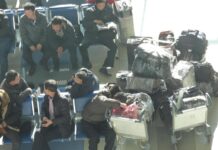[imText2]Case #1. Last April, Hong Song Ki, a North Korean tradesman from Hamheung, North Hamkyung died in his sleep while on a business trip in Shinuiju.
Hong spent his days collecting marine life in South Hamkyung and selling them in Dandong, China. Since the late 90s, Hong traded marine produce with the Chinese and began to make a successful living.
Hong was relatively healthy at 176cm and 80kg, quite a rare stature in North Korea. Not only was it surprising then that a healthy man would suddenly lose his life, but more astonishing was Hong’s reason of death.
Hong was a heroin addict. The basis of his death was an overdose of heroin and sleeping tablets. Hong would walk around boldly as a newly-rich merchant. Then 3 years ago, he began to take drugs. In the end, he could not withstand his drug addiction and met his death at a young age.
A North Korea-Chinese tradesman who knew Hong well said, “His family was astounded that an absolutely healthy person suddenly dropped dead. People say he took drugs because he had too much money and some say that money is evil.”
Inhale Philopon and rinse with sugar water
Case 2. The same month, in a house in Shinuiju, 4 men are playing cards in a room full of thick smoke amidst a low battery powered light. These 4 men restock electronic goods at the markets. They are average North Korean men in their late-30s and early-40s.
These men are in the midst of gambling, betting over North Korean 1,000won. (US$0.37) Even though the time has passed until the early hours of the morning, the men are not absorbed by anything other than the game. Once in a while, a white substance is placed on white foil and burned. The men inhale the air. It cannot be said that these men wear expressions of tiredness. Only their eyes have turned a deep red.
Every now and then, the men consumed by gambling ask for sugar water. The wife of the homeowner enters the room occasionally attending to their request for sugar water. These men are inhaling philopon as they gamble away. Inhaling philopon through the nose and mouth creates a bitter taste in the mouth and sugar water is used to rinse the mouth.
These cases can be commonly found around North Korea. These drugs which were once taken by the rich and elite secretly in the late-90s have now expanded down to the average person and tradesmen. The situation has become so severe that it is common to see people playing cards and inhaling philopon around ones own home.
It is mistaken to apply the notion that drugs are evident in any society on the North Korean situation. Drugs are taking a rampage across North Korea. From young children to the elderly, drugs are taking over the country at a fearsome rate, irrelevant of age and class.
On the whole, drugs that circulate North Korea are manufactured within the country. In the past, North Korea created officially its own production of opium called “White bellflower campaign.” The main and well-known factory which produces drugs is Chongjin’s Nanam Phamaceutical Factory in North Hamkyung.
Recently, the region of Hamheung is being targeted as the headquarters of drug manufacture. This is to the extent that drugs produced from Hamheung are sold on the black-market in Pyongyang, Chongjing and Shinuiju with great faith.
In North Korea, philopon is the most common drug found. People call the drug “ice” as the drug takes the form of tiny white grains. During the refining process, the drug is separated into two categories “shots” and “ice.”
In addition to philopon, heroin and morphine are commonly taken. In North Korea, heroin is taken in the form of tablets. Though quality will affect the cost of drugs, philopon (refined ice) is currently selling for 10,000~15,000 won (US$3.4~5.1) per gram. Tablets are sold for $100 per 30 capsules.
How severe is North Korea’s drug use?
In early June, the DailyNK met North Korean tradesmen who had come to visit their relatives in Dandong. According to these tradesmen, the situation of drug use in North Korea is severe. They said that the greatest number of drug users were in Pyongyang and Hamheung, South Hamkyung.
Choi Myung Gil (pseudonym) who had come from Hamheung, South Hamkyung to visit his relatives in Dandong, China said that he had come to China with a legal passport in order to gain economic support from his aunt.
In response to the reporter’s questions regarding the number of drug users in Hamheung, Choi said, “Basically, anyone with a little bit of money in Hamheung takes drugs, especially traders. Many long distance bus drivers and cargo drivers do, too. What’s more, security agents and safety agents also take drugs.”
“Hamheung citizens believe that taking small amounts of drugs is actually very good in curing illnesses. Taking philopon or tablets is effective when you have a cold or temperature, diarrhea, blood pressure, or facial paralysis. Everyone knows this” he said.
Heroin was initially circulated throughout North Korea as a drug to alleviate pain and to treat colds, and is used as a treatment by morphine and opium users. Nonetheless, though it is a drug which alleviates pain 10 times more effectively that morphine, people become dependent on heroin and develop withdrawal symptoms.
Choi admitted, “It could be different according to people’s addiction and the number of times they have taken drugs, but you could say that the majority of people who eat rice for meals in Hamheung have tried drugs. Even I used heroin when I had a temperature and cold and my whole body was aching to the bones.”
He said, “The truth about North Korea is that there is no adequate treatment even if you do get sick. However, there is more than enough drugs so you don’t have much choice but to use it.”

















